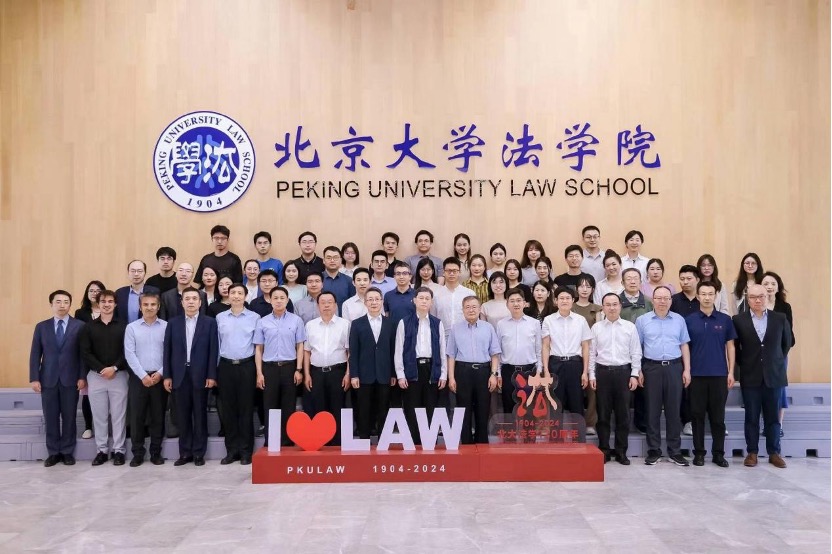Peking University Center for Digital Law and 2024 Peking University Digital Law Annual Forum Successfully Held
Date:2024-12-24
On June 8, 2024, the Peking University Digital Law Annual Forum (2024) was held in the Lecture Hall of Kaiyuan Building of Peking University Law School. Hosted by Peking University Law School and Peking University Center for Digital Law, the forum carries out interdisciplinary discussions on cutting-edge topics such as digital rule of law and AI legislation, inviting experts in relevant fields of academia and practice to contribute insights and respond to the questions of the times. Jiang Wei, Vice President of China Law Society and President of Network and Information Law Research Society, Gan Zang Chun, Vice President of China Law Society, Yang Hewing, Director of Economic Law Office of the Law Commission of the Standing Committee of the National People's Congress, Li Changi, Director of Network Rule of Law Bureau of the National Internet Information Office, Lin Wei, President of Southwest University of Political Science and Law, Wang Yiyi, Vice President of Renmin University of China, and Shi Jianzhong, Vice President of China University of Political Science and Law, and experts, scholars, and practical people were invited to attend the conference. The meeting was attended by experts, scholars and practitioners.
Peking University Center for Digital Law Launch Ceremony
The forum marked the establishment of the Peking University Center for Digital Law, and the inauguration ceremony was presided over by Dai Xin, Vice Dean of Peking University Law School. Professor Guo Lei, Dean of Peking University Law School, warmly welcomed the guests from academia and practice on behalf of PKU Law. He said that in the face of the new round of technological revolution, the digital governance of the rule of law and the digitisation of the rule of law construction have become the core features of national governance in the 21st century. On the occasion of its 120th anniversary, Peking University School of Law has officially established the ‘Peking University Center for Digital Law’, which aims to better support and integrate internal and external research forces, improve the overall level of digital rule of law research, promote academic exchanges and cooperation in related fields, and provide theoretical support and talent reserves for domestic and international rule-making and practice. The forum will also provide a platform for the development of the digital rule of law in China and abroad. The convening of this forum will also provide a high-quality communication platform for experts and scholars and promote the cause of digital rule of law in China to move forward.
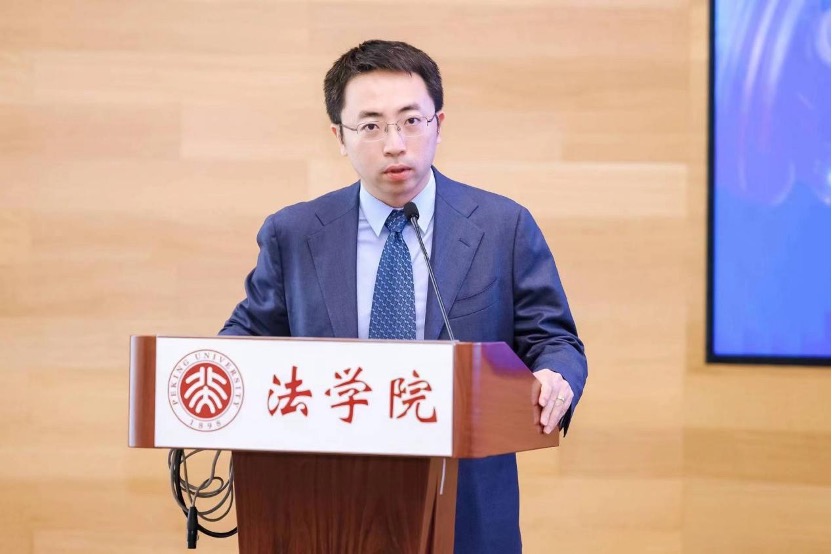
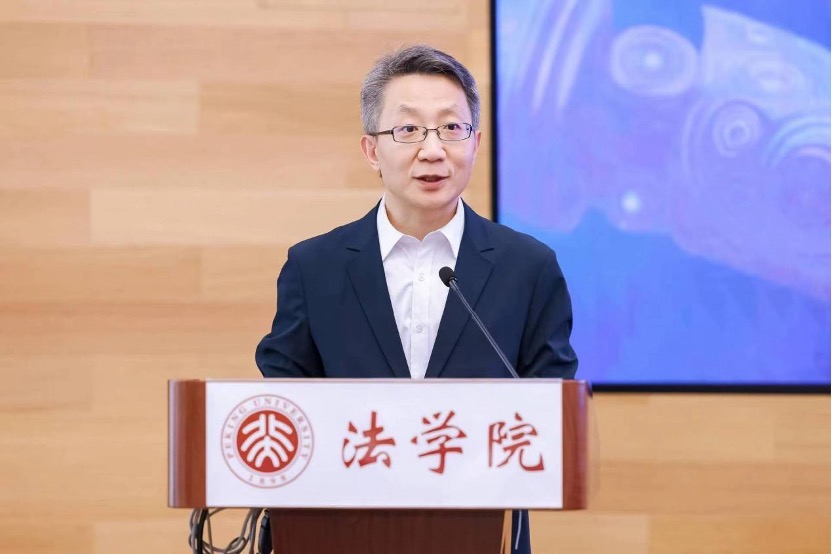
Professor Jiang Wei, Vice President of the China Law Society and President of the Research Society of Network and Information Law, pointed out in his speech that the establishment of the Center for Digital Law at Peking University Law School and the holding of the First Annual Forum on Digital Rule of Law are the inheritance of the characteristics of Peking University's legal education, and also an undertaking to carry on the previous and the future, and hope that Peking University Center for Digital Law will become a leading academic institution in China and a world-class academic institution, and will provide support for China's digital It is hoped that the Center for Digital Law of Peking University will become a leading academic institution in China and a world-class academic institution, providing support for digital legal education and legal practice in China. President Jiang Wei gave an in-depth explanation of the goals, principles and methods of AI regulation, focusing on the timing of legal regulation of AI technology, the extent of legal regulation of AI technology, and the effectiveness of the rule of law in guaranteeing the development of AI.
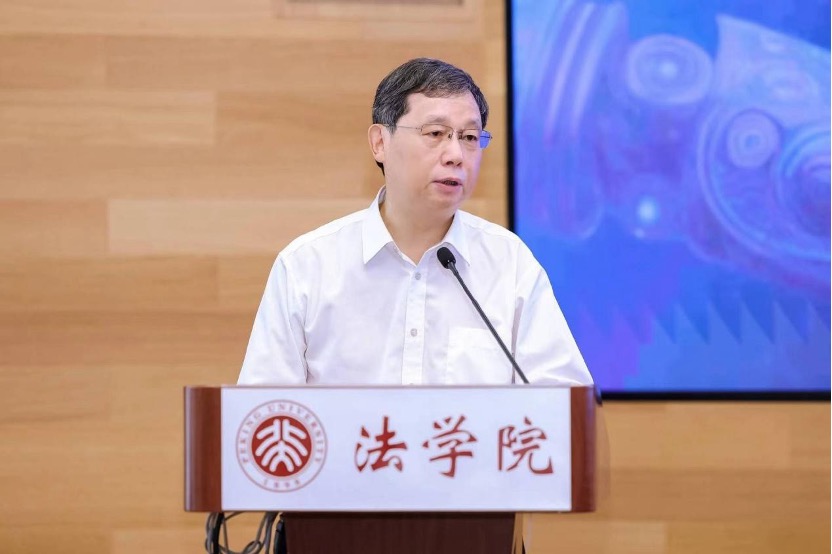
Yu Fengliang, Chairman of Changchun Jida Zhengyuan Information Technology Co., Ltd, the supporting unit of the conference, expressed his heartfelt congratulations on the 120th anniversary of Peking University Law School, reviewed the development history of Jida Zhengyuan and its cooperation with Peking University Law School, and looked forward to the cooperation between Jida Zhengyuan and Peking University Center for Digital Law.
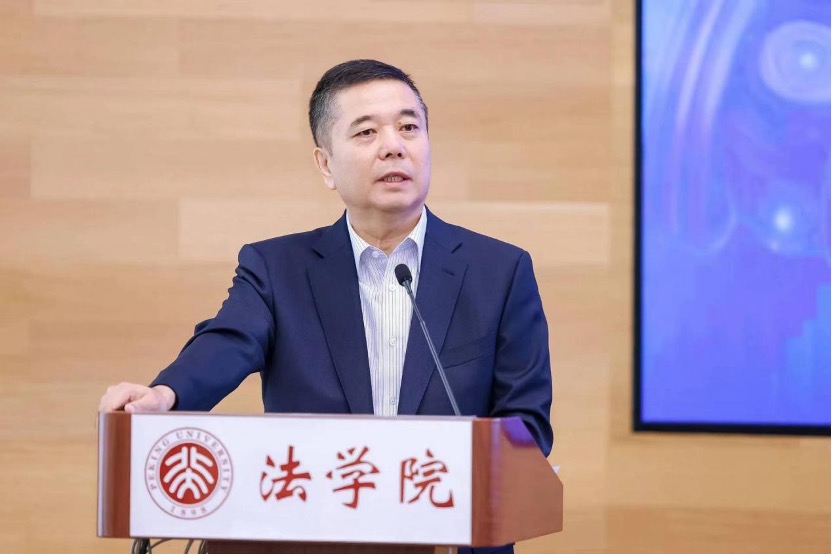
Professor Wang Xizhen, Director of the Center for Digital Law of Peking University, expressed his sincere gratitude to all the guests for their participation and support. He said that the official establishment of the Center for Digital Law is an important point to carry on the past and the future, and that the Centre will focus on four aspects, namely, enrolment and teaching, academic exchanges, institutional research, and international cooperation, and will strive to achieve the goal of striving for excellence.
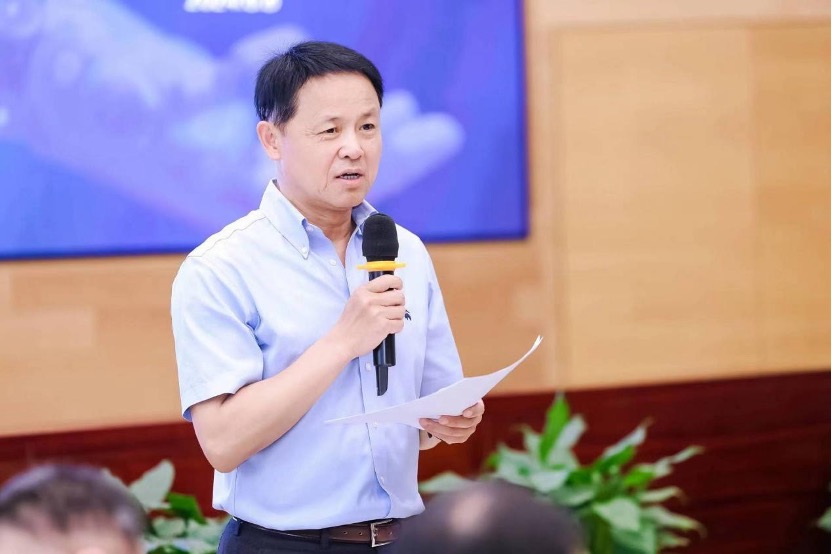
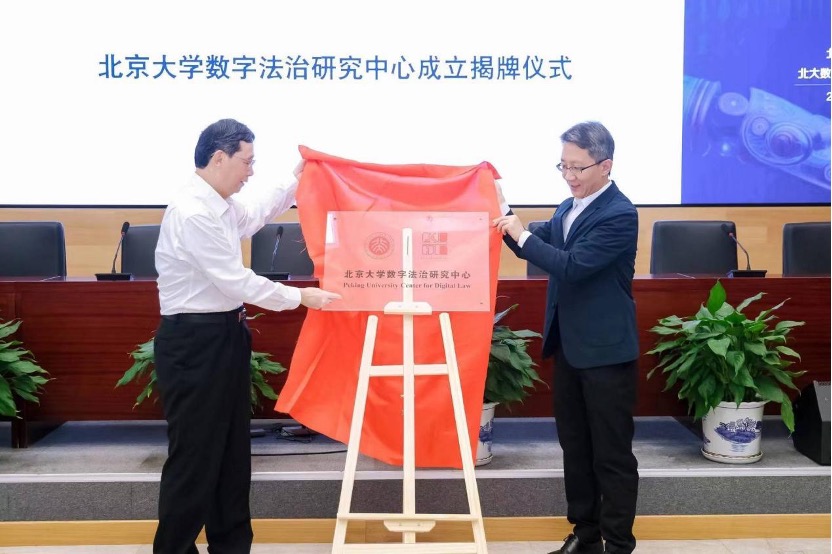
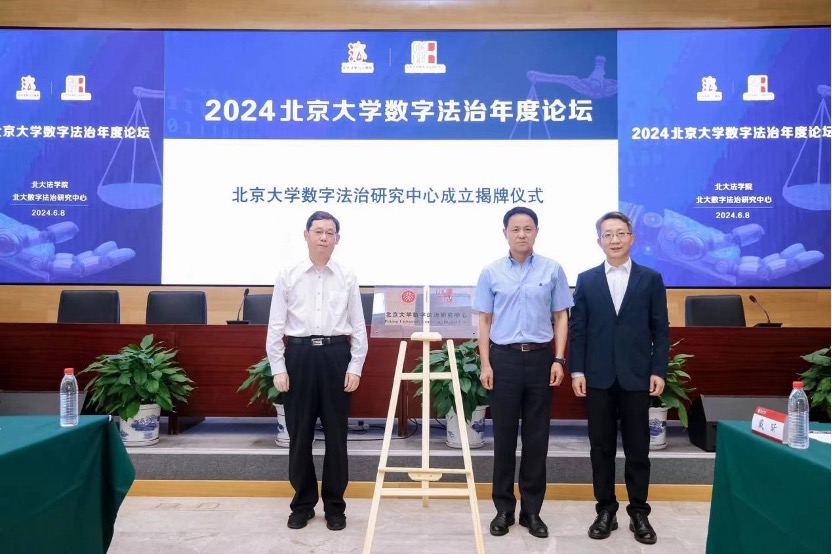
Keynote speaker forum: cutting-edge topics in building the digital rule of law
The keynote speech forum was chaired by Professor Wang Xizhen, Director of the Center for Digital Law of Peking University.
Professor Gan Zangchun, Vice President of the China Law Society, said in his speech that the digital era is redefining human production and lifestyle, which requires law, economics, ethics, sociology and other disciplines to conduct joint discussions and responses. The digital era brings about a fundamental legal change with multi-dimensional structure and multiple relationships. How the law responds to the challenges of the digital age is of paramount importance, and it must support the value orientation of intelligence and goodness, integrate development and security, build a new type of legal relationship between human rights, technological power and public power, use a variety of legal mechanisms to cope with the changes, and strengthen international cooperation on the rule of law in digital affairs, so as to contribute China's wisdom to global digital governance.
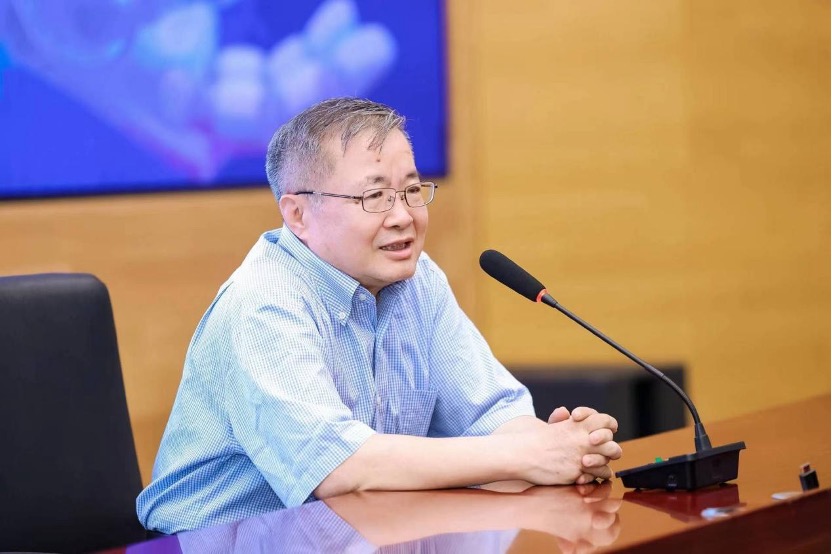
Li Changxi, Director of the Network Rule of Law Bureau of the National Internet Information Office, reviewed the thirty-year history of China's full-featured access to the Internet. Through the construction of a complete system of legal norms, an efficient implementation system, a strict supervision system and a strong protection system, China's network rule of law construction has made remarkable achievements. He summarised the five major experiences of adhering to the leadership of the Party, the people-centred development ideology, the concept of serving economic and social development, systematic planning and systematic promotion, as well as inheritance, innovation and openness and cooperation, and put forward the need to further deepen the concept of ruling the Internet according to law, and to build up a complete system of laws and norms, an implementation system, and a monitoring and guarantee system, in order to provide a solid system of institutional guarantee for the future development.
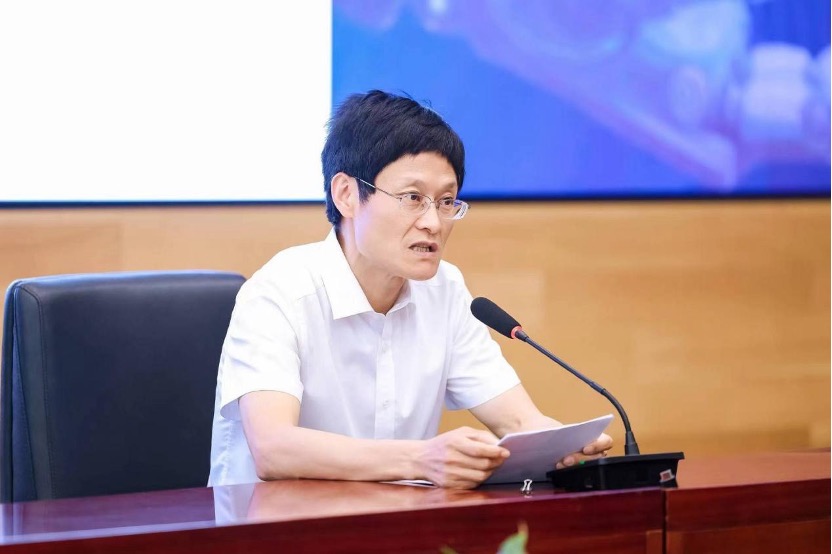
Yang Heqing, Director of the Economic Law Office of the Law Commission of the Standing Committee of the National People's Congress, delivered a keynote speech on the topic of ‘Building the Digital Rule of Law with Trust and Cooperation as the Starting Point’. He summarised the features of the digital era, including decentralisation of information transmission and decentralisation of data generation, before reviewing the main lines for promoting the construction of the rule of law in the digital society. He stressed that governments often needed to rely on the technical and data capabilities of Internet platforms when managing the digital economy, and that a close partnership should be established between governments and platforms to meet the challenges posed by information technology. Platforms needed to ensure neutrality and transparency, collaborate with governments for better online governance and protect users' rights and interests.
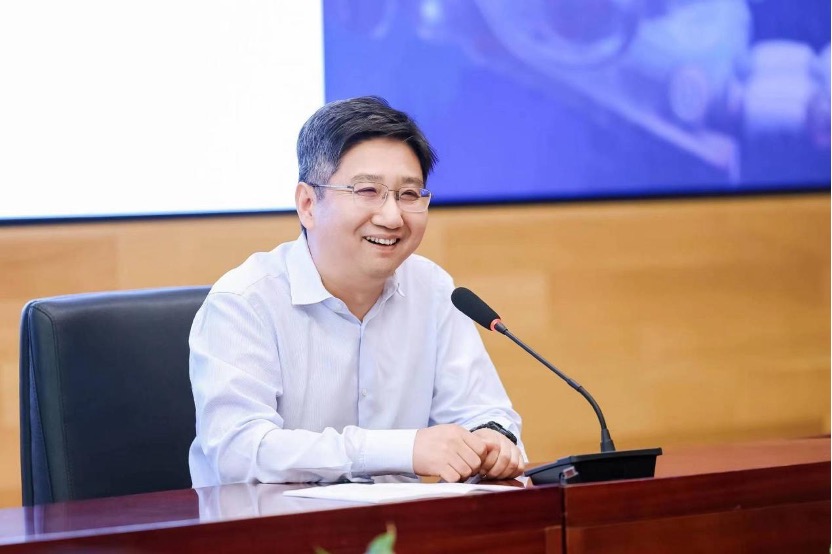
Professor Lin Wei, President of Southwest University of Political Science and Law, shared insights into the changes in crime and the governance of criminal law in the digital age. With the rapid development of digital technology, the forms and means of crime have changed dramatically, posing unprecedented challenges to social governance and the application of criminal law. Traditional crimes also show the typical characteristics of subcontracting in the cyber era, while new types of crimes such as cyber fraud and data leakage are rapidly rising in the digital era, with more high-tech and anonymous means of committing crimes, forming a complex cybercrime ecology. Professor Lin Wei proposes that criminal law governance in the digital era needs to adapt to the new reality, promote comprehensive governance of the digital ecology, and cope with the risk of transnational cybercrime through international cooperation.
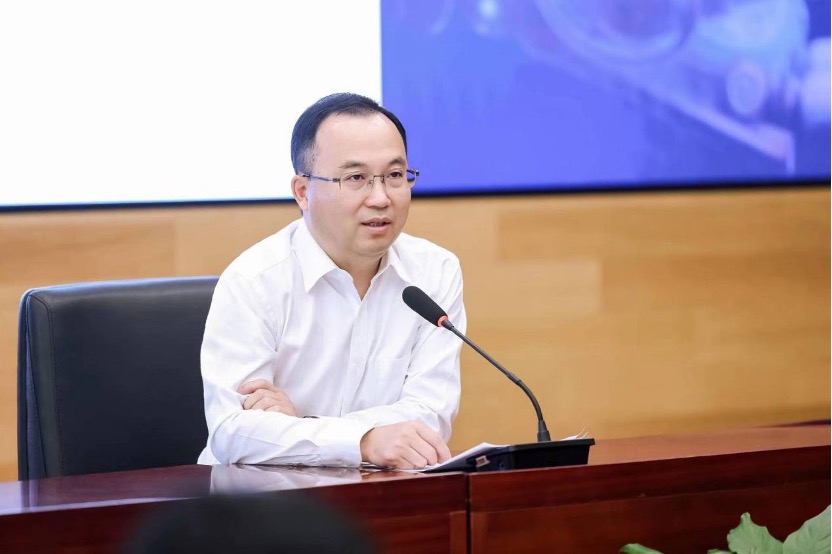
Professor Wang Yi, Vice President of Renmin University of China, discussed in depth the significance of civil law to the digital rule of law. Professor Wang Yi started his discussion from the perspectives of ‘how to see’ and ‘what to do’. He argued that the development of civil law has evolved from an agricultural civilisation, an industrial civilisation to an information civilisation. The provisions of the Civil Code on the protection of data, network virtual property and the protection of personal information marked the transformation and development of civil law in the digital age. Solving the initial distribution of data property interests is the key to the digital rule of law, and it is necessary to combine the relevant provisions of the Civil Law and the Constitution to explore the attribution of data property interests and ensure balanced interests and distributive justice.
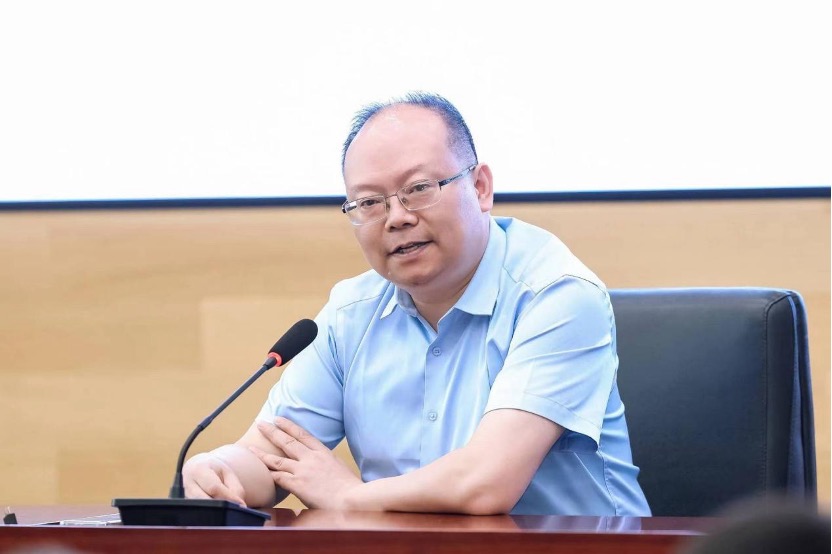
Professor Shi Jianzhong, Vice-President of the China University of Political Science and Law, expressed his thoughts on data rights in the context of the ‘Twenty Articles on Data’. He pointed out that the relationship between data, data resources and data products was complex, and that the division of rights might restrict the flow of data and hinder the maximisation of data value. Therefore, he advocated breaking down these boundaries and reshaping the mutual circulation and transaction relationships among the rights to hold data, the rights to process and use data, and the rights to operate data, to better meet the needs of data circulation and transaction.
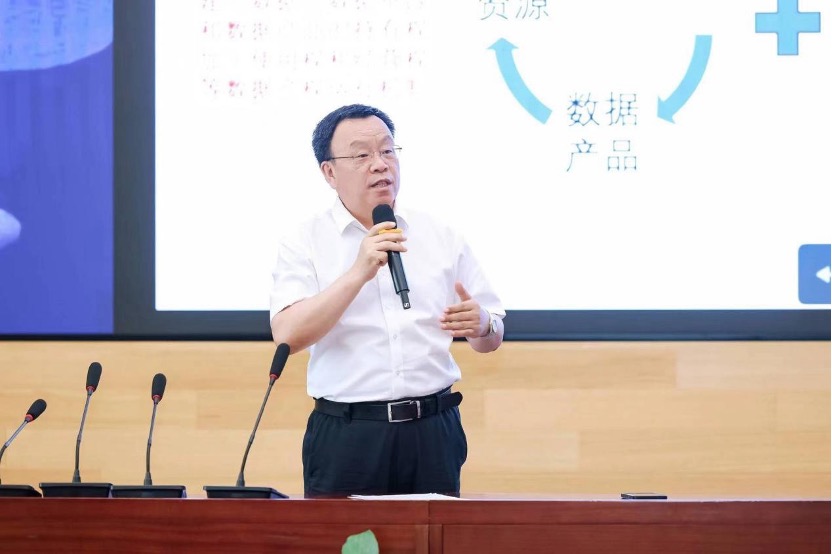
Zhang Shouwen, Boya Distinguished Professor of Peking University, summarised the keynote speeches of the six guests, affirmed the academic and practical significance of the relevant speeches, and pointed out the research directions that can be sustainably advanced in the future.
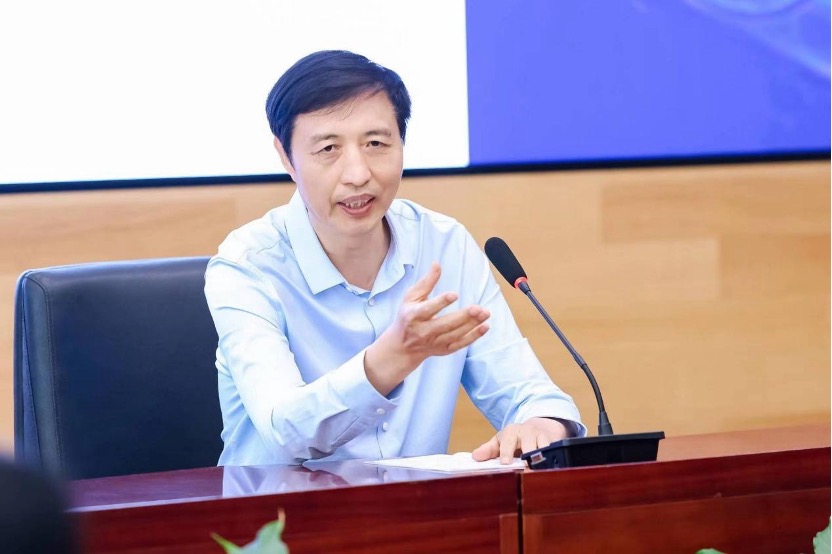
Digital Rule of Law Symposium: Theoretical Issues and Institutional Framework for Artificial Intelligence Legislation
Keynote Report: Multidisciplinary Perspectives on Artificial Intelligence Governance
The theme of the afternoon symposium on digital rule of law was ‘Multidisciplinary Perspectives on Artificial Intelligence Governance’, which was chaired by Yang Xiaolei, Deputy Secretary of the Party Committee of Peking University School of Law, and Deputy Director of Peking University Institute of Artificial Intelligence. He emphasised that AI governance needs to be considered comprehensively from multiple dimensions, including technology, law, ethics and policy, to establish a perfect governance system.
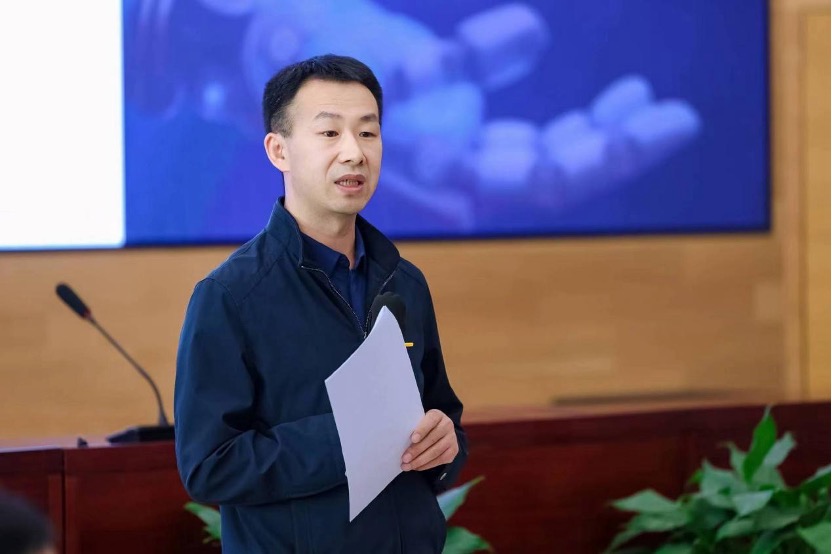
Professor Zhang Ping of Peking University Law School elaborated China's concept and practice in AI governance and introduced the international consensus and important international documents on AI governance in his report entitled ‘Chinese Practice and International Synergy in AI Governance’. There are differences in the positions and implementation paths of various countries in AI governance. Challenges in AI governance involving intellectual property rights, algorithmic governance and pluralistic governance can be considered to establish a national-level AI safety research institute and strengthen international synergy under the UN framework, focusing on the problem of restricted training data, arithmetic and algorithms faced by China. The current legal framework cannot fully address the legality of AI training data, and industry self-regulation and technical measures will be an important direction for the future.
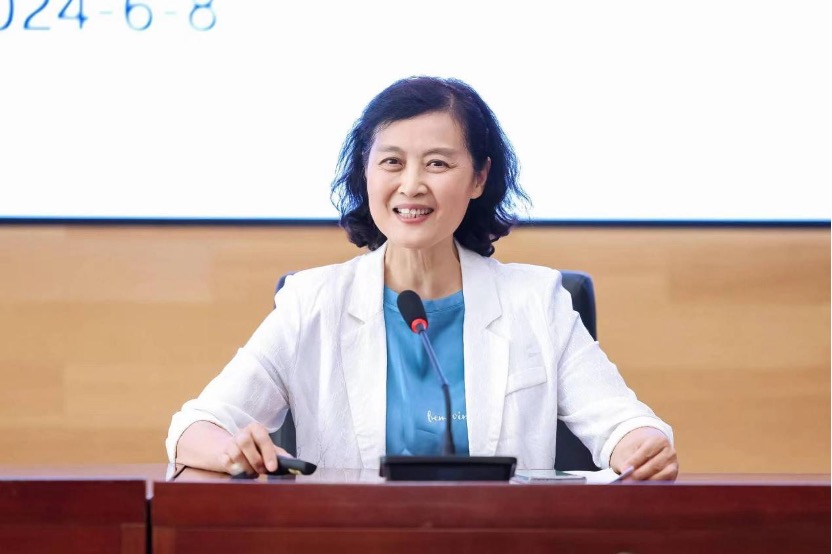
Professor Ma Xiujun of the School of Intelligence, Peking University, focused his speech on ‘Governance Issues from the Perspective of Artificial Intelligence Technology’. The development of AI technology is ever-changing, and after entering the AI era, cloud computing not only manages databases and software, but also manages AI algorithms, which opens the ‘era of smart computing’. Under the influence of artificial intelligence, the Internet industry may face reconstruction, and the business model and technical background will undergo architectural changes. Large models could generalise and handle multiple tasks at the same time. The regulation of AI shall not be limited to big models but should also include interactions between AI bodies that may exceed the number of humans in the future. To ensure that these technologies are human ethical, he suggests laying out the regulation of AI application systems in advance from a communication perspective. Consideration could be given to creating an AI governance model that combines legal rules and technological experiments.
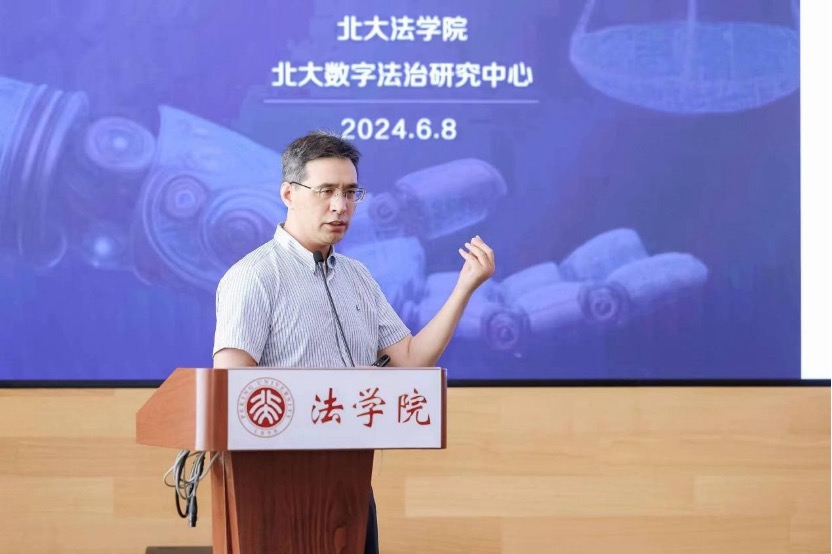
Professor Juan Juan Meng of the Guanghua School of Management, Peking University, analysed the impact of the use of AI technology on human social behaviour and equity. She pointed out that AI could either completely replace or assist human work in the labour market, and that the two scenarios had different impacts on social equity. Substitution tends to exacerbate inequity, while assistance may promote social equity. Meanwhile, cross-cultural studies have found that different countries and cultures value privacy differently and for different reasons. In addition, she discussed behavioural issues triggered by artificial intelligence, such as polarization of thought, digital addiction and cognitive degradation.
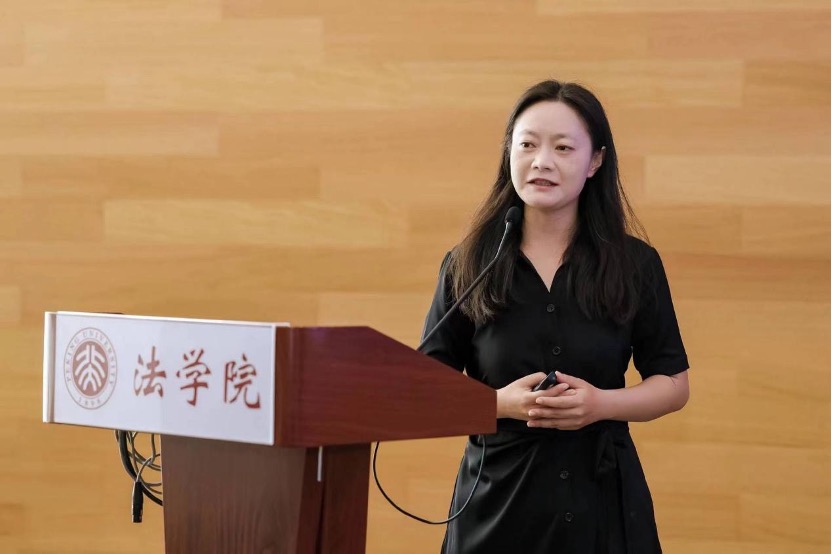
Associate Professor Yu Chengfeng of the School of Law of Beijing University of Aeronautics and Astronautics spoke on the topic of ‘Ethical Risks and Jurisprudential Reflections on Generative Legal Megamodels’. He firstly introduced the working principle of the current AI application models, especially the legal big models, and analysed the four major problems in the application: the statistical nature of the models leads to the lack of in-depth legal interpretation ability; the black-box and interpretability problems; the sea of questions; and the algorithmic bias. He argues that AI should be seen as a new type of communication rather than a mere intelligence. Finally, he explores the impact of AI on legal communication in three dimensions: social, temporal and factual.
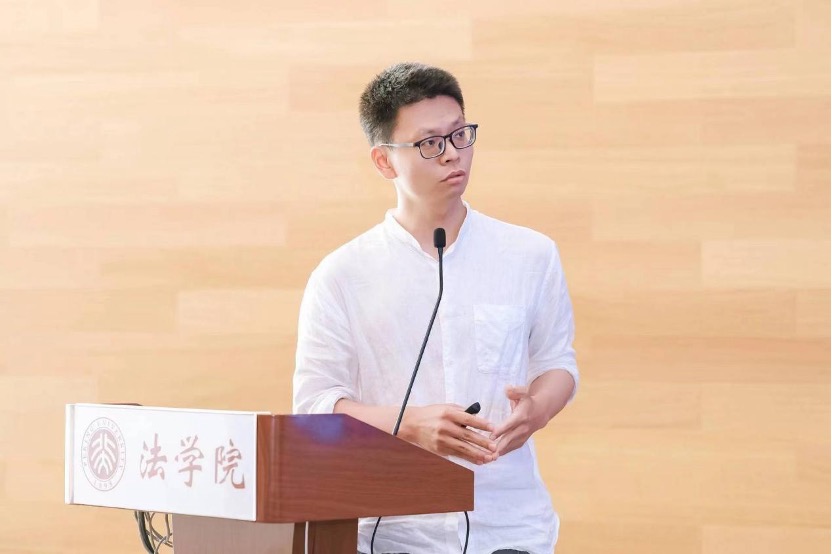
Round-table discussion: Theoretical and practical issues of artificial intelligence legislation
Round-table discussion session I
The first roundtable seminar was hosted by Professor Zhang Xin of the Law School of the University of International Business and Economics, focusing on the necessity of legislation, the choice of legislative timing, the coordination and convergence of the legislative system, the comparison of extraterritorial legislation, the core issues of the seminar, and the impact of the legislation on AI in the foreground, and other key issues, to carry out exchanges from the shallow to the in-depth.
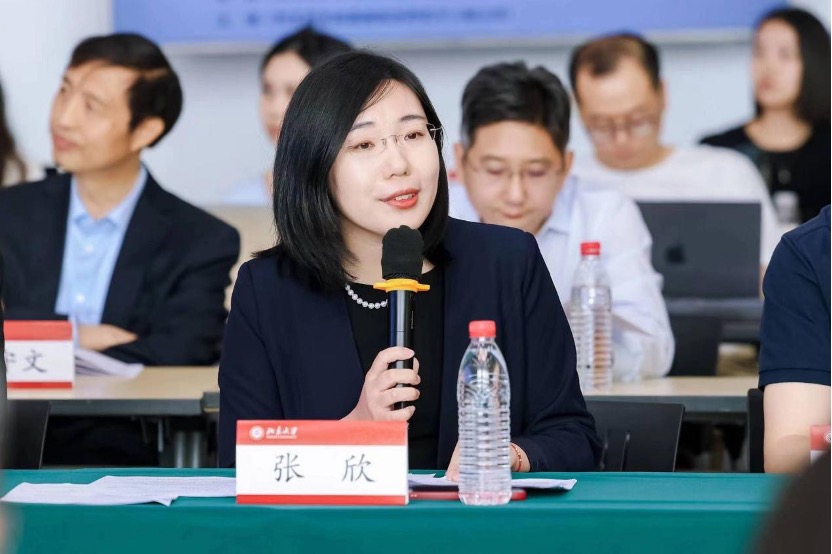
Addressing the issue of the necessity of AI legislation, Professor Zhang Linghan of China University of Political Science and Law elaborated on the necessity of legislation from three perspectives: industrial interests, technological development and international competition. She called for relevant legislation to be introduced as soon as possible to provide a comprehensive reference and discussion framework for AI governance. Zhou Hui, Deputy Director and Associate Researcher of the Network and Information Law Research Office of the Institute of Law of the Chinese Academy of Social Sciences, pointed out that the current development of AI technology requires a defined legal environment. Existing legal frameworks such as intellectual property law, data security law and personal information protection law need to be adjusted to accommodate the development of AI technology. The current two-track regulatory model suffers from conflicts and incoherence. The development of a foundational law can help form regulatory synergies and improve regulatory efficiency. In addition, it is necessary to analyse the issue of how to build a rational law regulatory mechanism from the perspective of central-local relations. Professor Dai Xin of Peking University Law School pointed out that AI, as a broad concept covering a variety of automated processes, is difficult to have a clear boundary definition. The function of AI is like that of the Internet, which is integrated as a specific production tool to form a new infrastructure. Therefore, it is very difficult to carry out AI legislation in the sense of substantive regulation. However, the development of framework legislation has important expressive value. Legislation should focus on issue orientation, cover key legal relationships and dispute resolution paths, meet practical needs, and be able to effectively address important risks even if it is not highly systemic.
To address the coordination and convergence of the legislative system. Professor Zhang Linghan pointed out that the Artificial Intelligence Law may be positioned as a factor law, industry promotion law, service application law, regulatory law or basic law, and its relationship with existing laws needs to be analysed. She emphasised that the Artificial Intelligence Law needs to address the issues of arithmetic power, algorithmic models, AI industrial applications, and human-machine relations that cannot be covered by existing laws. Associate Professor Wu Xuan, Executive Director of the Institute of Network and Data Law at the School of Law and Politics, Shanghai Normal University, proposed that, firstly, the Artificial Intelligence Law should inherit and develop based on the existing legal framework for network information, refining the platform's responsibilities and covering the roles of developers, providers and users. Second, the Law should integrate traditional legal rules at the application level to address new issues brought about by AI. Finally, the Artificial Intelligence Law should translate ethical guidelines into specific legal norms and provide clear directions.
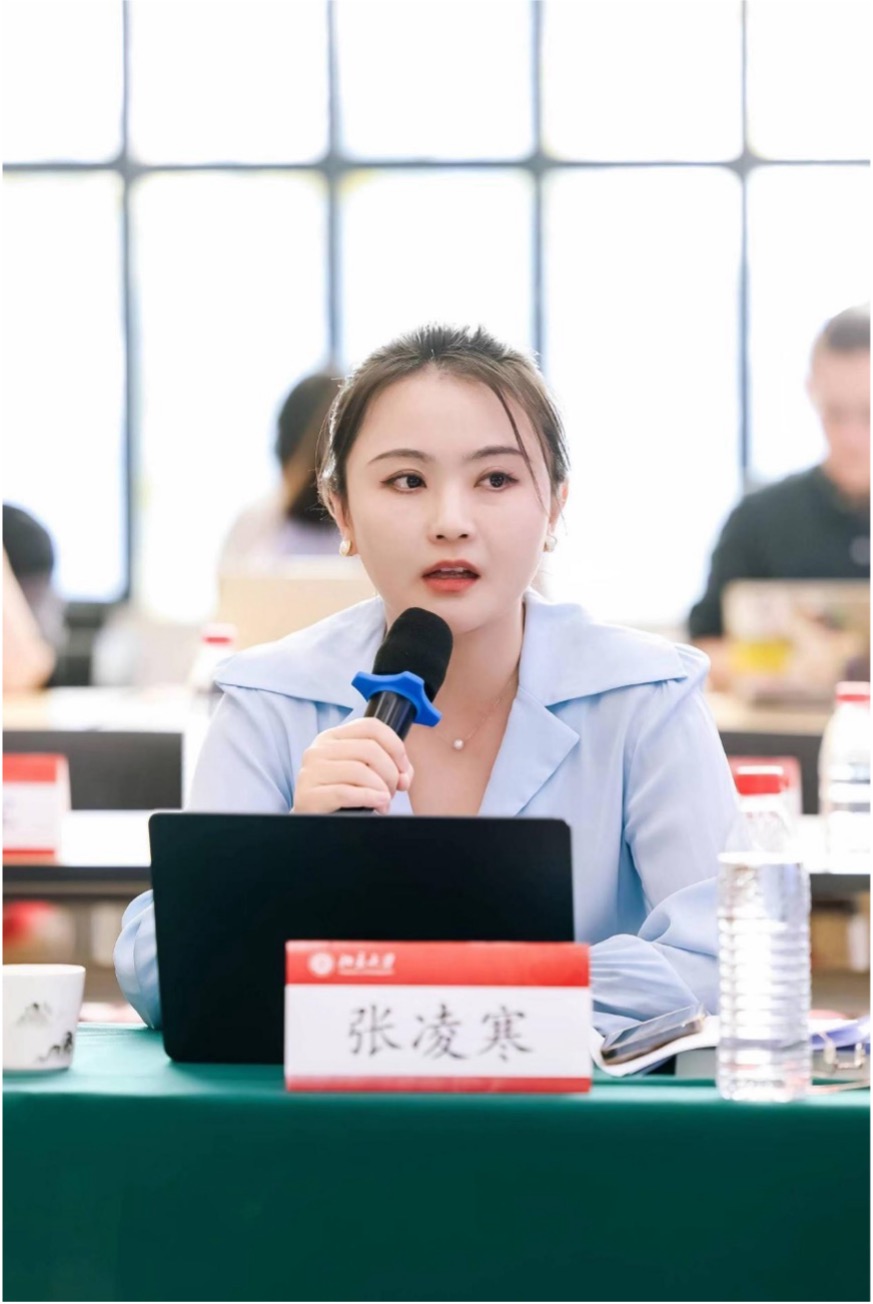
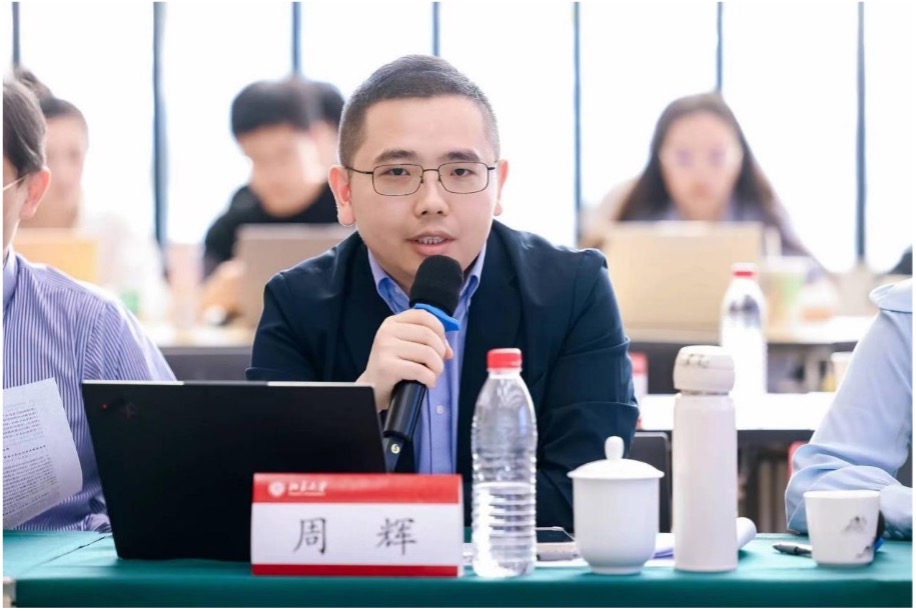
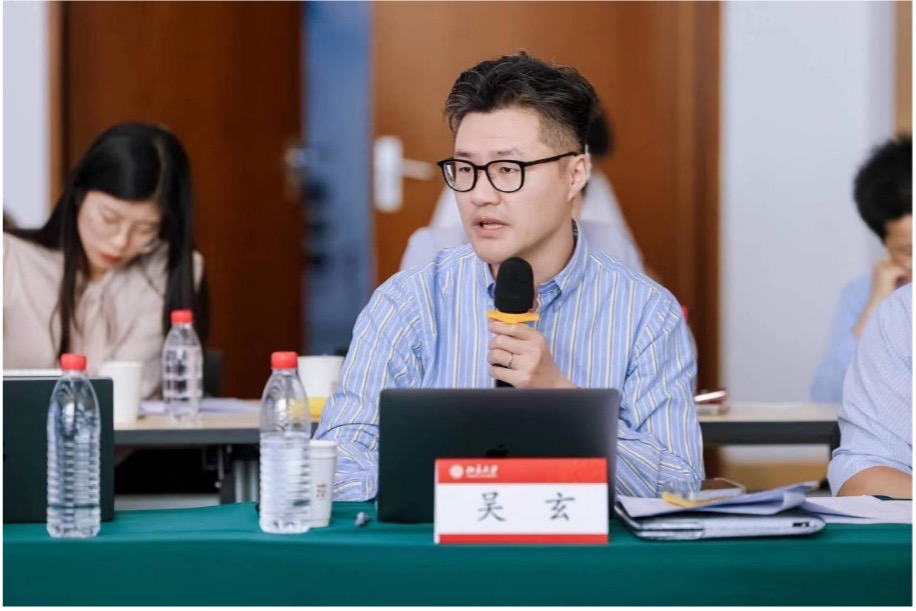
Addressing the uniqueness and legislative logic of the Artificial Intelligence Law. Associate Researcher Zhou Hui pointed out that the Artificial Intelligence Law needs to achieve a deep integration of development and regulation, and to respond to different risks in a graded manner, including identified risks, expected risks and unanticipated risks. In addition, the law should design systems to promote development, such as innovations in the intellectual property system, open-source incentives, and fiscal exemption mechanisms for security inputs.
In response to the extra-territorial overview and comparative questions. Professor Ding Xiaodong, Vice President of the Future Rule of Law Institute at Renmin University of China, pointed out that the EU's AI Law is currently the most comprehensive AI legislation in the world, adopting the idea of risk regulation. However, he found the EU's approach of subjecting AI systems to separate risk assessment problematic. He stressed that China should learn from the EU's classification methodology, while avoiding the mechanical objectification of AI and should comprehensively consider its dual attributes as a service and a product. Professor Peng Luo of Peking University Law School pointed out that AI law and AI legislation are two different concepts, and that legislation needs to clarify goals and values, design appropriate systems and implement regulatory and remedial mechanisms, and called for transcending traditional jurisprudence and combining social sciences for interdisciplinary research in the legislative process. Professor Zhang Linghan pointed out that China should not copy and paste the EU's legislative thinking, but should consider the cultural differences and difficulty of predicting AI risks. She mentioned that there are limitations in the EU's application of risk assessment methods to AI governance, failing to provide an effective generic AI regulation scheme. She called on China to consider its own situation and wisdom and carefully formulate the AI Law to avoid over-reliance on other countries' experiences. Associate Researcher Zhou Hui pointed out that AI legislation in the United States focuses on two main aspects: regulating the government's AI application activities as well as encouraging government agencies to demonstrate the application of AI. The U.S. supports market development through government procurement, while providing operational guidelines in terms of judicial and independent regulation. China should learn from the United States experience and strengthen the dialogue between Chinese and American enterprises and practical experts on the front line of governance.
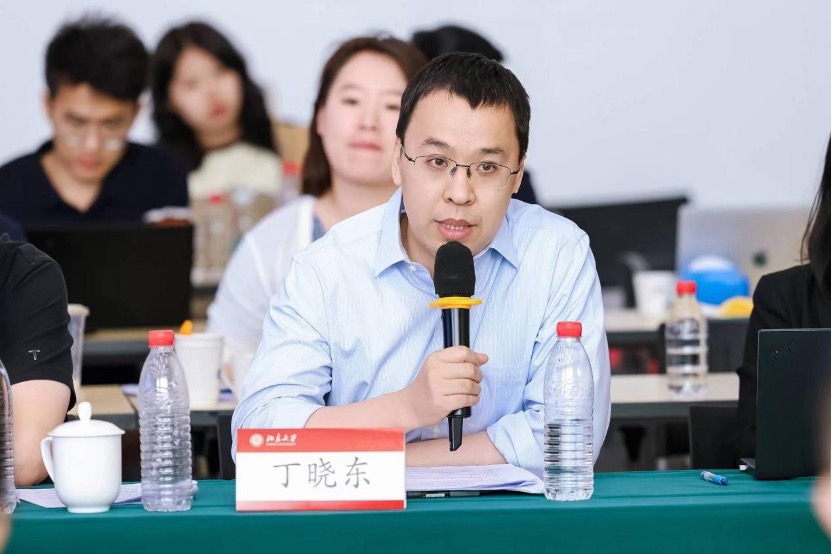
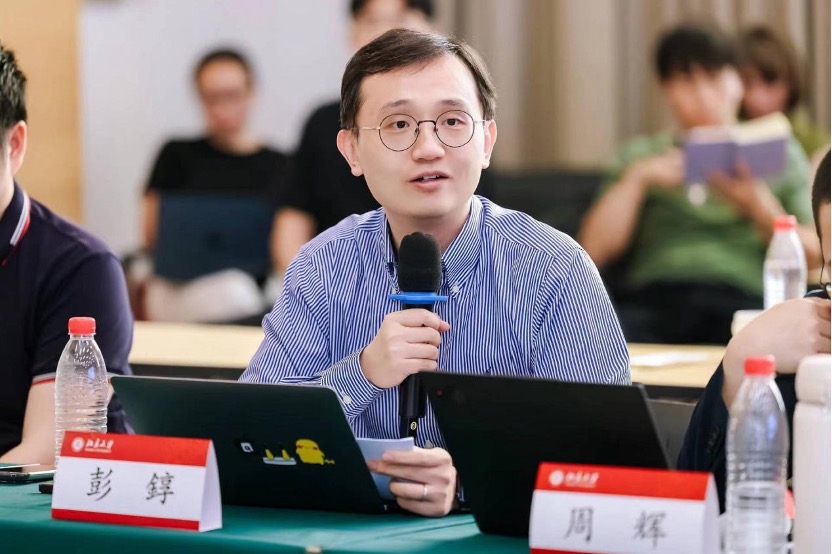
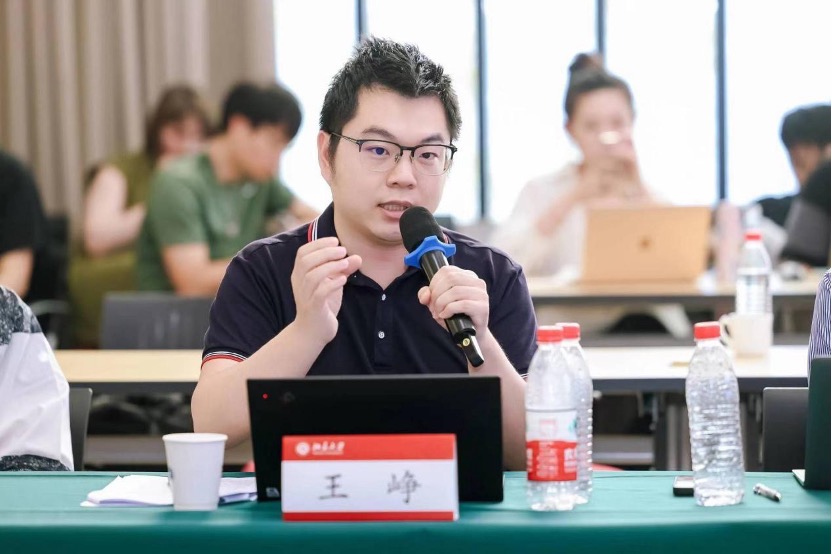
In response to the issue of basic model regulation. Wang Zheng, Deputy Director of the Data Economy Research Centre of the Ali Research Institute, pointed out that the definition of models should not be based on technical standards alone, but also need to consider risk characteristics and cost-effectiveness. Basic models should have higher security standards accompanied by reduced liability pressure. Deputy Director Wang Zheng suggested that strict ex ante restrictions should be transformed into ex post relief and compensation, and that model output should be controlled through the output side to ensure content compliance and security.
Round-table discussion II
The second roundtable discussion was moderated by Gao Fei, Director of the Economic Law Office of the Law Commission of the Standing Committee of the National People's Congress. He said that AI legislation needed to consider the uncertainty of technological development and the challenges posed by diversity.
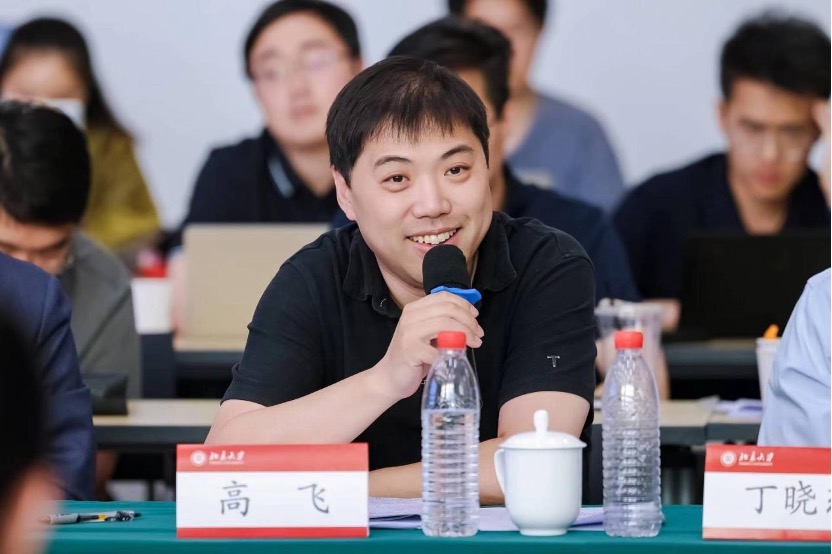
Associate Professor Hu Ling of the Law School of Peking University pointed out that the underlying model should not be regulated separately, but dynamically adjusted in the light of actual social and economic changes. It was suggested that technical standards should be left to the industry to form from the bottom up. On open-source liability exemption, he stressed that the actual effect is more important than the process, and that a liability system needs to be developed according to the specific conditions of the field. Regarding ethical issues, he suggested that specific judgements should be made from the perspective of social relations, and that it would not be appropriate to comprehensively cover all ethical issues in the law.

Li Li, Executive Director of the Legal Research Institute of Jingdong Group, provided insights on the necessity of generative AI, training data management, open-source system construction, and global governance implications. She emphasised that the development of generative AI is necessary despite the challenges of technological breakthroughs. She called for tolerance on training data management and suggested exploring fair use under the existing legal framework. She also noted the importance of an open-source system and called for a credible exemption system. Regarding global governance, she suggested that China should develop a framework and declarative AI law to participate in international rulemaking.
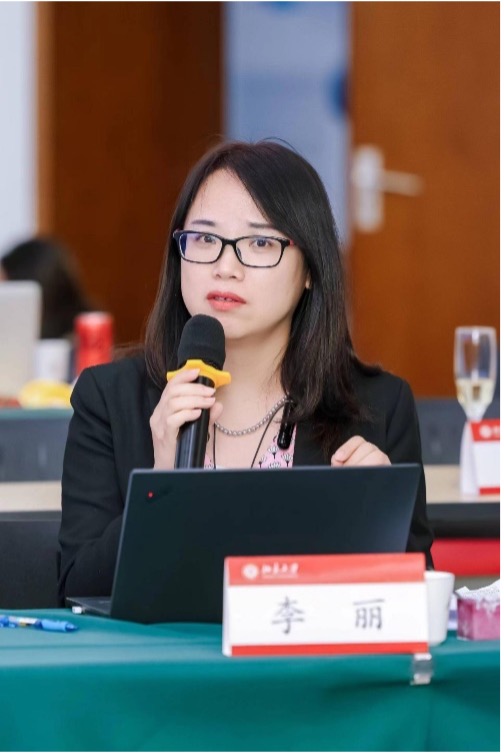
Wang Rong, chief data law expert of Tencent Research Institute, suggested that it is not a ripe time to formulate an Artificial Intelligence Law, as the technology and business models are not yet mature, and most of the risks are already covered by the existing regulatory regime. She believes that the EU's Artificial Intelligence Law may face an awkward situation and should be treated with a critical attitude, and that the legislation should be carried out after the technology and business models have matured to better respond to practical problems.
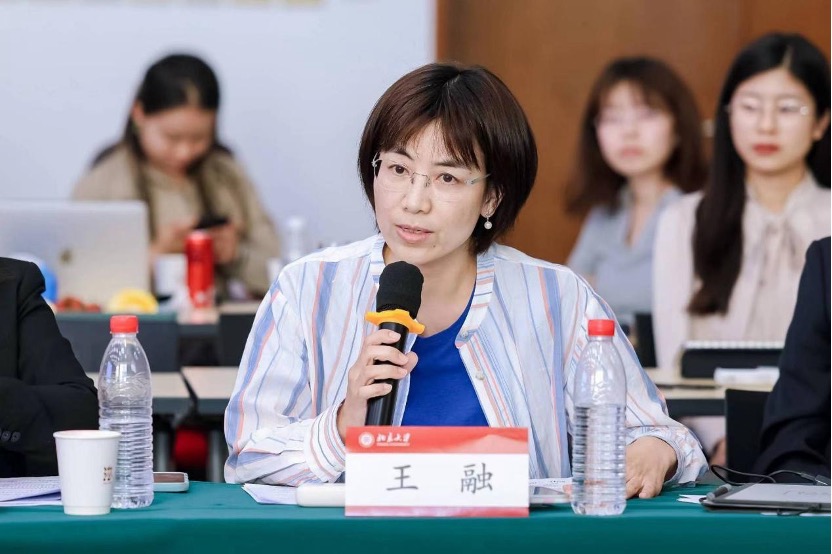
Conference Summary
In the summary session of the forum, Dai Xin, Vice Dean of Peking University Law School, said that after the establishment of the Center for Digital Law, Peking University Law School hopes to contribute intellectually to the development of the Digital Rule of Law through substantive activities and results, in cooperation with various relevant experts and institutions both inside and outside the university. At the end of the meeting, Professor Wang Xizhen, Director of Peking University Center for Digital Law, summarized the theoretical consensus and constructive results formed in this forum, and expressed his gratitude to the participating scholars and experts on behalf of Peking University Center for Digital Law, and looked forward to the future cooperation and exchange.
